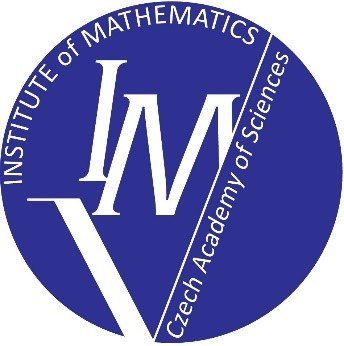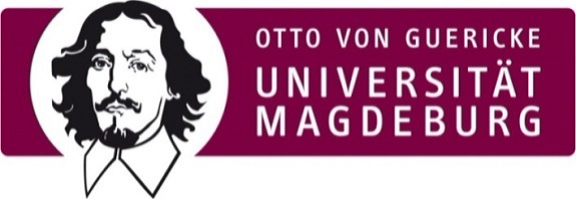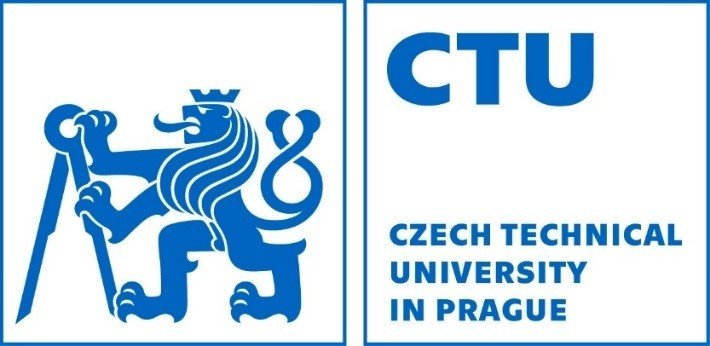Main lecturers:
- Prof. Dr.-Ing. Martin Sommerfeld, Multiphase Flow Systems, Otto-von-Guericke University Magdeburg, Germany
- Prof. Dr. Olivier Simonin, Institut de Mécanique des Fluides de Toulouse (IMFT), France
- Dr.-Ing. Martin Wörner, Karlsruhe Institute of Technology (KIT), Germany
Local lecturers:
- Prof. Petr Koči, University of Chemistry and Technology, Prague, Czech Republic
- Dr. Jakub Elcner, Brno University of Technology, Brno, Czech Republic
Local Organiser:
- Prof. Tomáš Bodnár, Czech Technical University in Prague
Course programme is available here
| 8:30 | Registration | |
| 8:45 | Introduction to the course; Characterisation of multiphase flows (45 min) - Martin Sommerfeld (OvGU) | |
| 9:30 | Numerical methods for multi-phase flow: Common basis and differences (60 min) - Martin Wörner (KIT) | |
| 10:30 | Refreshments (30 min) | |
| 11:00 | Industrial challenges and needs for the application of CFD to industrial dispersed multiphase flows (60 min) - Olivier Simonin (IMFT) | |
| 12:00 | Lunch (60 min) | |
| 13:00 | Point-particle Euler/Lagrange methods, fundamentals, implementation and coupling, turbulent dispersion (60 min) - Martin Sommerfeld (OvGU) |
|
| 14:00 | Forces on spherical particles and deformable bubbles (60 min) - Martin Sommerfeld (OvGU) | |
| 15:00 | Refreshments (30 min) | |
| 15:30 | Multi-Fluid (N-Euler) approach for polydispersed dilute or dense particle-laden flows ES subgrid modelling in particle laden flows (60 min) - Olivier Simonin (IMFT) |
| 16:30 | Numerical simulation of liquid dispersion inside a rotating packed bed (45 min) - Jakub Elcner (BUT) |
| 17:15 | Q & A (30 min) |
| 19:30 | Joint dinner at a restaurant to be announced |
| 8:30 | Eulerian multi-fluid model for gas-liquid flows: A universal and efficient approach (60 min) - Martin Wörner (KIT) |
9:30 | CFD/DEM (Euler-Lagrange) approach for particle-laden flows with finite size particles (60 min) - Olivier Simonin (IMFT) |
| 10:30 | Refreshments (30 min) |
| 11:00 | Combined CFD and DEM models for micro-scale simulations of porous catalytic filters (45 min) - Petr Kočí (UCTP) |
| 11:45 | Resolved simulations of multi-fluid flows: Great insights at high costs (45 min) - Martin Wörner (KIT) |
| 12:30 | Lunch (60 min) |
| 13:30 | Modelling elementary processes in dispersed multi-phase flows (solid particles, spray droplets and bubbles) (60 min) - Martin Sommerfeld (OvGU) |
| 14:30 | LES of particle-laden flows in the frame of Euler-Lagrange and Euler-Euler approaches (60 min) - Olivier Simonin (IMFT) |
| 15:30 | Refreshments (30 min) |
| 16:00 | An old separation device and new findings: The Cyclone Separator (30 min) - Martin Sommerfeld (OvGU) |
| 16:45 | Problem shooting session, presentations from participants (60 min); (Registration required, please submit your proposal, we will try our best to help solving your problem) - ALL Delegates are offered the opportunity to present their work via 10 minutes presentations (problem-shooting session), thereafter, the lecturers can offer prospective solutions. Registration is required: martin.sommerfeld@ovgu.de. |
Multiphase Flows Rationale:
The simultaneous presence of several different phases in external or internal flows such as gas, liquid and solid is found in daily life, environment and numerous industrial processes. These types of flows are termed multiphase flows, which may exist in different forms depending on the phase distribution, such as separated and dispersed systems. Examples are gas-liquid transportation, crude oil recovery, circulating fluidized beds, sediment transport in rivers, pollutant transport in the environment and atmosphere, fine particle separation, cloud formation, fuel injection in engines, bubble column reactors and sprays for food processing, to name only a few. As a result of the interaction between the different phases such flows are rather complicated and very difficult to describe theoretically.
Consequently, the numerical calculation of multiphase flow systems based on CFD methods also comprises a multitude of different numerical methods each applicable to certain types of multiphase flows and resolving different length and time scales of the problem. The present course focusses on numerical simulations of dispersed multiphase flows and the required modelling of particle-scale phenomena. The hierarchy of available numerical techniques for the different scales in multiphase flows (i.e., particle-scale and industrial-scale simulations) is presented. Both the well-known Euler/Euler and Euler/Lagrange approach, suitable for large-scale simulations of industrial processes, are introduced in detail. Required modelling for particle-scale transport phenomena is presented and the use of particle-resolved direct numerical simulations for their development is emphasised. Examples of a number of advanced models are presented and their effects on large-scale processes are highlighted.
This course is rather unique as it is one of few in the community that is specifically designed to deliver, a) best practice guidance and b) the latest trends in CFD for dispersed multi-phase flows and c) many application examples.
The course appeals to researchers and engineers involved in projects requiring CFD for turbulent dispersed multi-phase flows with bubbles, drops or particles.
Moreover, participants are offered the opportunity to present their work via 10 minute presentations
(problem-shooting session), thereafter, the lecturers can offer prospective solution.
Registration is required: martin.sommerfeld@ovgu.de
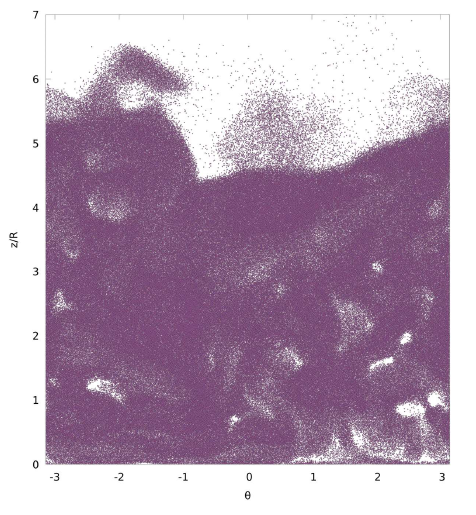
Yales2 CFD-DEM simulation of the instantaneous particle distribution in a fluidised bed close to the wall; particle size 875 microns, solid density 740 kg/m3, fluidization velocity is 0.32m/s and the number of tracked particles is 9 631 313 representing a total mass of 2.5 kg (LGC/IMFT, Toulouse, 2024).
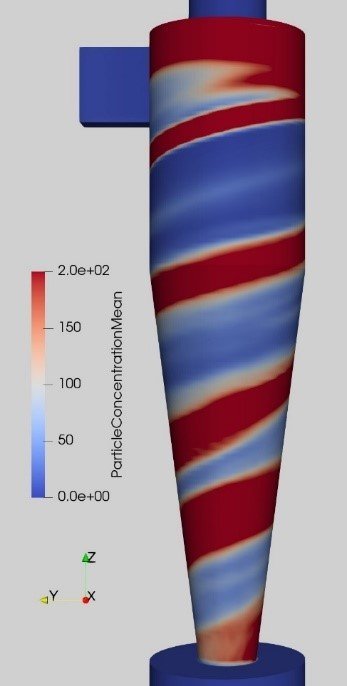
Euler/Lagrange results for particle separation in a 290mm gas Cyclone with rope formation, inlet velocity 10 m/s, mass loading 1.0, MPS-OvGU 2023)
Course leaflet is available here

IInterface-resolving simulation of the impact of a water droplet on a thin water film (CRC/TRR 150, TU Darmstadt/KIT, 2024).
TRANSPORT:
After arriving at airport in Prague – the Vaclav Havel Airport, the most frequent and convenient option is to take the trolleybus number 59 from the airport to "Nádraží Veleslavín", and then change to the metro line A (green). The institute is located short walk from the station on line A "Mustek" or "Muzeum". If using metro line B (yellow) the nearest metro stop is Karlovo Náměstí. The nearest tram stop is Štěpánská.
For taxi travel from the airport, the official provider is Uber, which can be booked on the app or at the airport. Another app service is Bolt. Beware of not booked taxis waiting at the airport, they are notorious for scamming passengers.
The information about public transport can be found at:
Registration: ERCOFTAC CADO: admin@cado-ercoftac.org
Registration Fees (a reduction of 50€ applies to ERCOFTAC members):
- Industry: 700€
- Academia: 500€
- PhD Students: 350€
Please contact admin@cado-ercoftac.org if you have any questions.
BPG of CFD for Dispersed Multi-Phase Flows 2024 with Problem Shooting Session
Reference: DMF
Member Prices (click to sign in)
Non-Member Prices


